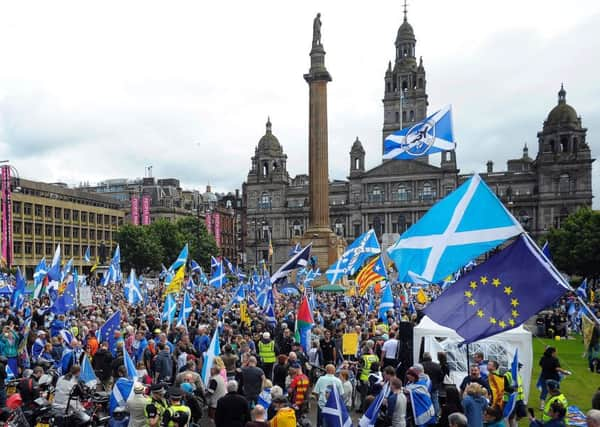Tom Peterkin: Fact is that facts get lost in heat of Brexit politics


The fortissimo mood music coming from the Scottish Government over the last couple of days would suggest that Scotland is hurtling towards another independence referendum.
In the wake of the Supreme Court’s Brexit judgment, Nicola Sturgeon upped the ante as she angrily claimed Scotland’s voice was being ignored and put her foot down on the indyref2 accelerator.
Advertisement
Hide AdAdvertisement
Hide AdAt the moment the “will she?/won’t she?” referendum dance being led by the First Minister is tipping towards the former option as the tortuous process of extricating the UK from the EU heats up.
In these fevered times, extracting the facts from the political hot air emanating from the different sides of the debate can be almost as daunting as the Brexit process itself.
So it was that Labour yesterday demanded that Alex Salmond apologise for distorting the truth after a television appearance by the former First Minister.
Salmond’s crime, according to Labour, was his analysis of public opinion when comparing Brexit with Scottish independence. On BBC Newsnight, Salmond pointed out that the Scottish vote for remaining in the EU was 62 per cent, compared with 55 per cent wanting to stay in the UK.
“Far more people in Scotland, by majority and percentage, wanted to stay within Europe as wanted to stay within the United Kingdom,” Salmond said.
Strictly speaking Salmond was correct. Labour’s beef, however, was that his remarks did not take into account the relative turn-outs of the two referendums. When it comes down to the actual number of votes cast, two million Scots rejected independence outnumbering the 1.66 million who voted to remain in the EU. “His claim is what Donald Trump’s administration might call an ‘alternative fact,” exclaimed the Labour MSP Lewis Macdonald.
Salmond put his gloss on the statistics to support his argument that Scotland and the rest of the UK are set on wildly divergent political paths. Macdonald, on the other hand, used the numbers to back up his argument that Scotland does not want another referendum.
Differing interpretations of statistics were in evidence again with the publication of the Scottish Government’s export figures.
Advertisement
Hide AdAdvertisement
Hide AdThe figures were accompanied by a Scottish Government press release quoting Economy Secretary Keith Brown.
Brown argued that the figures demonstrated the importance of remaining within the European single market.
To back up his case, Brown stated: “It is clear that since the vote to leave the European Union we must continue to be seen to be a country that is outward-facing and open for business. The EU market is eight times the size of the UK market, which highlights the importance of remaining in the single market.”
What the Economy Secretary neglected to say when he claimed the EU market was eight times bigger than the UK was that the eight-fold difference was in terms of population – and nothing to do with the scale of Scottish exports there.
The Scottish Government figures, which were laid out in an official document and the press release, showed that exports to countries within the European Union were estimated as £12.3 billion in 2015, an increase of £520 million on the previous year.
They, however, were dwarfed by exports to the rest of the UK which were estimated at £49.8 billion, an increase of £2.1 billion. By that measure, Scotland’s trade with the rest of the UK is worth four times exports to the EU. Unsurprisingly that was the statistic that Scottish Secretary David Mundell chose to trumpet.
“Today’s figures show the UK is the vital union for Scotland, and highlight the importance of maintaining the UK market and preventing any new barriers to doing business across the UK as we leave the EU,” was how Mundell put it.
Underlining the importance of the UK market is a key strategy of the UK Government as the Brexit process enters its next stage. Today the Scottish Secretary will meet with Sturgeon’s Finance Secretary Derek Mackay and Brexit minister Mike Russell in the first of many meetings looking at repatriating powers from Brussels as the UK heads for the EU exit door.
Advertisement
Hide AdAdvertisement
Hide AdFor ideological reasons the SNP administration will argue that as many as possible come to Edinburgh. Mundell’s position is that maintaining the integrity and the effectiveness of the UK market must be the priority. He will enter today’s talks with the view that decisions must be made with that uppermost in people’s minds. Hence his determination to sell the message that the UK market is by far the most important one for Scotland.
That’s not to say the UK Government will oppose fresh powers coming to Holyrood. There are a number of areas which can best be dealt with in Edinburgh. There may be difficult items, such as the thorny issue of farm subsidies, which the UK Government will want to hand to Holyrood for reasons of political expediency.
Mundell will be faced with a strong SNP negotiating team, who continue to dangle the threat of a second independence referendum. It is the nature of politics that both sides will attempt to use “the facts” in their favour. The difficulty for the voters caught in the middle is that playing politics and the truth are not always a comfortable fit.